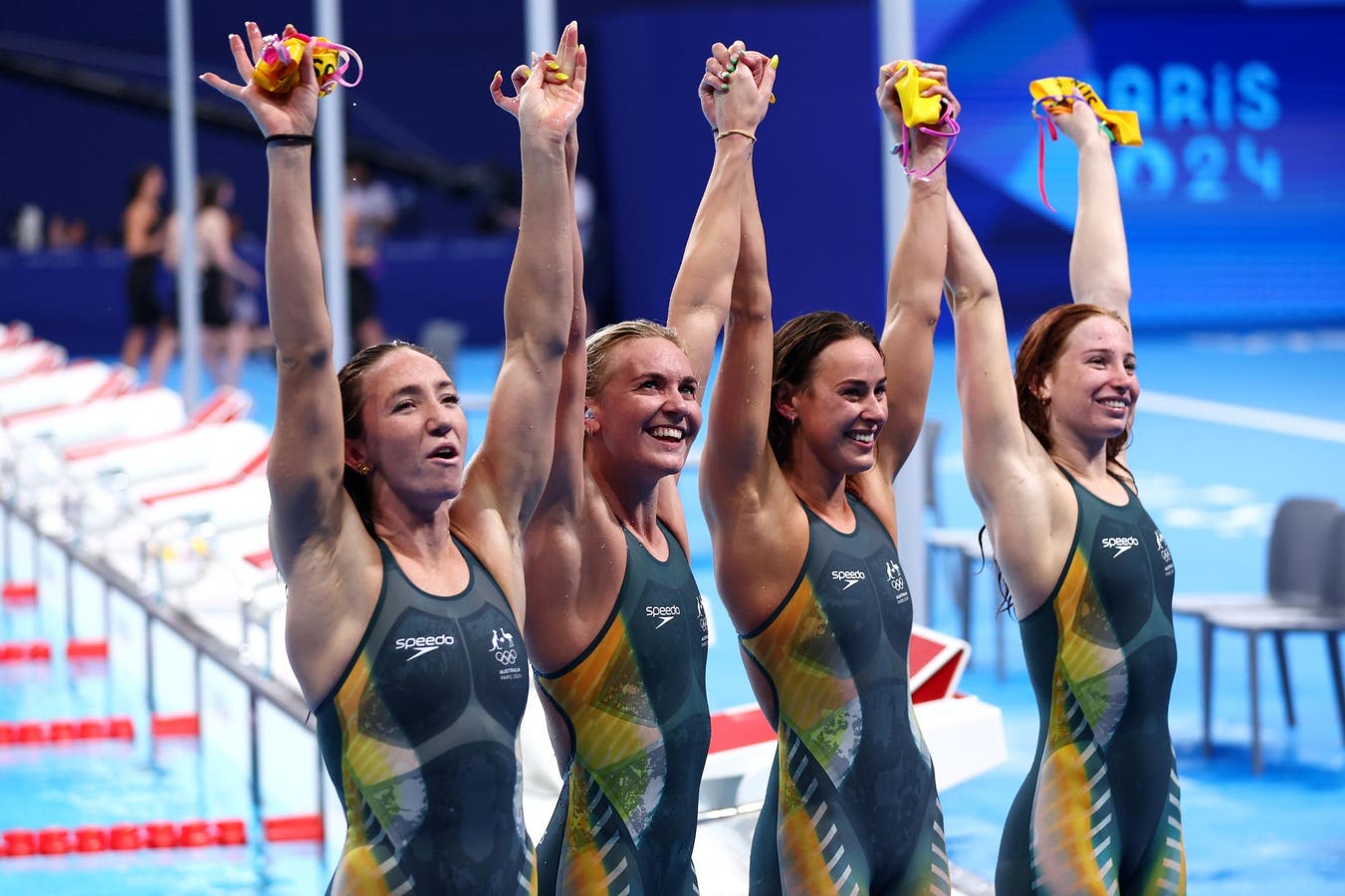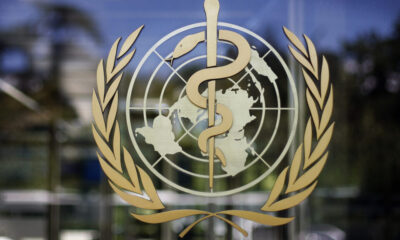Health
Will there be a Covid-19 outbreak at the Paris Olympics?

Lani Pallister seen here with her gold medal-winning teammates in the women’s 4×200 meter freestyle relay … [+]
Will there be a Covid-19 outbreak during the 2024 Summer Olympics? Well, it’s complicated – complicated by the Covid-19 surveillance approach the Paris Olympics have taken. Or rather, didn’t take it. To date, at least 40 Olympic athletes have tested positive for the severe acute respiratory syndrome coronavirus 2 (SARS-CoV-2). However, this number could very well be just the tip of the iceberg at the Summer Games, if you can imagine an iceberg during the 90-plus degree Fahrenheit weather Paris is experiencing today.
Without the Paris Olympics enforcing clear universal Covid-19 testing and test reporting protocols for all athletes and countries, it is unclear how many others have tested positive for Covid-19 without posting the result on Instagram or notifying their national Olympic committees have it reported. It is also unclear how many people were infected with the severe acute respiratory syndrome coronavirus 2 (SARS-CoV-2) but were ultimately never tested.
That’s basically what happens when you essentially rely on self-reporting to know what’s going on with Covid-19. Some people and countries may be more active in testing themselves and openly sharing test results. For example, the Australian Olympic Committee (AOC) has indicated that 16 of their athletes have tested positive for Covid-19 so far. Australian swimmer Zac Stubblety-Cook posted on Instagram that he is “dealing with COVID” not long after his silver medal in the men’s 200m breaststroke and the AOC confirmed he had completed a five-day antiviral course for Covid. The AOC also confirmed that another of their swimmers, Lani Pallister, has also been given antiviral drugs. Pallister had withdrawn from the women’s 1,500m freestyle event and later competed in the Australian 4x200m freestyle relay team.
In contrast, you haven’t heard any Covid-19 noise from many of the more than 200 other national Olympic committees represented at this year’s Games. Does this mean their peeps have been Covid-free? No, not necessarily. In fact, it is highly unlikely that the Australian Olympic team represents almost half of all Covid-19 cases among athletes in Paris. There is nothing about their green and yellow uniforms that should make them more susceptible to the virus than others. And athletes have certainly mixed between countries in different ways.
There also appear to be quite disparate ways in which athletes and countries have dealt with Covid-19. On the one hand, German decathlete Manuel Eitel informed everyone on Instagram on July 30 that he was withdrawing from the Olympic Games due to Covid-19.
On the other hand, there have been reports of athletes still participating in events even when they feel sick. For example, British swimmer Adam Peaty started feeling unwell ahead of the 100m breaststroke final. After participating in the event and winning a silver medal, he tested positive for Covid-19 on July 29.
British swimmer Adam Peaty started feeling unwell ahead of the 100m breaststroke final. After … [+]
And as I reported ForbesAmerican sprinter Noah Lyles tested positive for Covid-19 two days before the 200 meters final, self-isolated and received Paxlovid before racing to a bronze medal in the event.
Again, Peaty and Lyles are probably just the tip of the iceberg since they chose to go public with their Covid-19. Who knows how many other athletes are quietly struggling with Covid symptoms.
It is not surprising that different athletes and countries deal differently with feeling ill and testing positive for Covid. That’s what happens when there are no truly universal Covid-19 guidelines at the Paris Olympics. Naturally, athletes have been training for these Olympic Games for years. In many cases this was their sole focus. So it’s natural that they do what they can to participate in their events. It is also normal for them to be quiet about their physical condition before an event. After all, you don’t see many athletes walking up to the starting line of a race and yelling, “Everyone, I feel like poop today.” So here’s your big chance to beat me.’
It was much easier to determine whether there was a Covid-19 outbreak at the last Olympic Games in Tokyo in 2021. At the time, the Olympics enforced regular testing of athletes, as well as precautions such as the use of face masks and mandatory staying of athletes to remain isolated when testing positive for Covid-19.
Of course, things are different now with Covid-19 than they were in 2021. Hospitalization and death rates from Covid-19 were significantly higher. Everyone’s immune systems were much more “virgin” to SARS-CoV-2 and its spike proteins. If you have already come into contact with the spike protein several times through vaccination or infection, your immune system is much more likely to generate a more orderly and effective response against the virus. It won’t behave like that person who is on a date for the first time, tries all kinds of things and fails half the time. This accumulated experience with the spike protein is a key reason why your chances of developing serious problems due to an infection are likely significantly lower now than in 2021.
So it’s reasonable not to expect the same level of concern and precautions during this year’s Olympics. At the same time, Covid-19 has not disappeared. Because SARS-CoV-2 is not being monitored and studied as intensively as it was during the first two years of the pandemic, it is not entirely clear what the risk of hospitalization and death may be if you become infected with the SARS-CoV-2. How Therefore, at this time you still cannot treat SARS-CoV-2 in the same way as influenza and other respiratory viruses. While there aren’t many concerns about a ‘long flu’, getting Covid-19 still carries the risk of a long Covid-19 bout, where you continue to experience symptoms like fatigue, brain fog and a host of other possible symptoms long after your first infection.
The bottom line is that we can’t say whether a Covid-19 outbreak occurred during the 2024 Summer Olympics and, if so, how big it might be. All speculation is based on very flawed data and the lack of data in general. This is pretty much what happens day to day and week to week in many parts of the world, such as the US. Without sufficient and reliable data, it is very difficult to say when a Covid-19 outbreak will occur. Usually you find out about it after the fact, after reports of increased emergency room visits and hospital admissions. It’s a bit like watching the Olympics during prime time in the US. You only hear about things after they happen, and there’s not much you can do about it.













